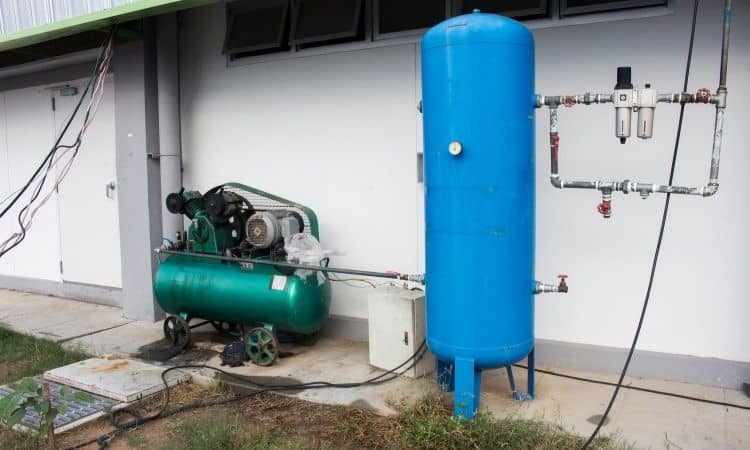Putting your air compressor outside is tempting. After all, your workspace would be much quieter and you’d save a little floor space, right? If you’re reading this post, I’m sure you’ve spent countless hours imagining how much better your life would be if you could just chunk that deafening compressor outside! But is it ok to do so?
As a general rule, most air compressors shouldn’t be stored outside. Exposure to rain, excessive heat, and weather in general can damage your compressor over time. That being said, its possible to safely store your air compressor outdoors so long as its placed within a structure that protects it from the weather.
If you’re dead set on placing your air compressor outdoors, read on to learn everything you need to consider prior to doing so.
Table of Contents
- What to Consider Before Installing an Air Compressor Outside
- Tips for Keeping Your Air Compressor Outside
- Can Air Compressors Get Wet?
- Can Your Air Compressor Stay Outside in the Winter?
- How to Winterize Your Air Compressor
- Conclusion
- Outside Air Compressors FAQ’s
What to Consider Before Installing an Air Compressor Outside
It’s entirely possible to keep your air compressor outside. But in order to keep your compressor working properly for a long time, it’s important to consider your outdoor setup before making the move. The major factors that can affect your compressor are moisture, weather, and wear. Let’s take a look at each of these factors.
Moisture
Water is the ultimate compressor-killer. Moisture, whether inside the compressor or outside, is something to protect against to ensure the life and proper function of the system.
Exposure to moisture is the number one reason to keep your compressor inside. But there are some things you can do to keep your compressor from getting damaged by moisture while it’s still outside. We’ll cover those below.
Weather
In some ways, moisture and weather go hand-in-hand. After all, rain and snow on your compressor can cause corrosion. But it’s not just the wet weather you should be concerned about. Windy conditions can also send debris crashing into the compressor, potentially damaging it.
The sun’s rays can also cause premature wear and tear of the compressor. Plus, extreme temperatures, both high and low, can affect the compressor’s efficiency, which means you’ll need to take precautions to protect the compressor in the summer and winter months.
Wear
Putting a compressor outside without taking proper precautions can increase wear, specifically on the air filter. Since the air outside is more likely to have dirt, dust, and debris present, the compressor’s air filter is more likely to clog faster. This means you’ll need to check and replace the air filter more often unless you can ensure cleaner air.
Of course, if you’re constantly grinding or sanding in your garage or shop, the air outside may be cleaner than the air inside. It all depends on what you do around the compressor.
Tips for Keeping Your Air Compressor Outside
Now that you know what to look out for, let’s take a look at what you can do to keep your air compressor outside without experiencing premature wear.
Install Automatic Drain Valve
Draining your compressor protects it from corrosion from the inside out. After all, there’s moisture in the air the compressor pulls in, and that moisture condenses and sits in the tank.
But if you keep your compressor outside, it’s easy to forget to drain the moisture from the tank regularly. But with an automatic drain valve, the compressor will drain on a schedule so you don’t have to worry about it, thereby protecting the compressor from moisture.
Keep it Covered
To protect the compressor from the elements, it’s a good idea to keep it covered. This is best done with a three-sided enclosure of some sort. Not only does keeping the compressor covered protect it from the elements, but it can also help reduce noise, which may be a concern for some.
If you build a complete enclosure with four sides, ensure ventilation so the compressor doesn’t overheat in the summer months.
Insulate the Air Hose
If you decide to keep your compressor outside, you’ll necessarily have air lines running from outside to inside your shop or garage. While this may not matter in mild weather, a drastic difference in temperature between outside and inside can cause problems. This is why it’s a good idea to insulate the air hose. For best results, dig a trench and bury the air line to keep it insulated.
Ensure Clean Air
You’ll want the cleanest air possible around your compressor. And having your compressor outside can either help or hurt this, depending on what you do in your shop. If you live in a particularly windy or dusty area, you’ll want to check your air filter regularly and replace it when it becomes clogged.
Make it Solid
You’ll want a solid foundation for your compressor to sit on outside. If you set it on dirt, you’ll be exposing the underside of the compressor to moisture from the ground. You can either pour a concrete slab or use concrete pavers to create a solid surface for the compressor.
Consider a Breaker
For safety’s sake, it’s best to have a breaker installed just for the compressor. It’s also a good idea to have a professional do the wiring, as it’s not the safest idea to have a simple extension cord running from the compressor to an outlet inside.
Can Air Compressors Get Wet?
Air compressors aren’t meant to operate when wet. Although they can get wet without total breakdown, it’s best to keep them dry as much as possible. The more a compressor gets wet, the more likely you’ll experience a malfunction.
This is why it’s important to build an enclosure for your compressor if you plan on keeping it outside. And if the compressor does get wet, it’s important to dry it off as much as possible before using it again.
Can Your Air Compressor Stay Outside in the Winter?
Keeping your air compressor outside in the winter requires additional considerations in order to protect it. Extremely cold temperatures can cause problems with the compressor, some of which can result in extreme damage to the compressor.
Can Air Compressors Freeze?
Since there’s no avoiding moisture in your air compressor, low temperatures can cause the moisture inside the compressor to freeze. The same can be said for moisture in the air lines, which can block airflow and make use impossible.
That said, you can still keep your air compressor outside. You’ll just need to take a few additional steps to protect the compressor from the cold.
How to Winterize Your Air Compressor
Protecting your compressor in the winter is similar to the general guidelines listed above for keeping your compressor outside. However, there are some cold-temperature specifics that you need to consider for the winter.
Keeping the Compressor Warm
As mentioned above, moisture is an inevitable byproduct of using a compressor. And if that moisture is allowed to freeze, it can damage components of the compressor, including pipes, hoses, and other internal components.
Keeping the compressor warm with a nearby heater also makes it easier to drain the condensate from the tank, which is an essential maintenance task that needs to be done regularly.
Mind the Hose Temperature
It’s not just the compressor that needs to be kept warm during the winter. The air hoses also need to be kept from getting too cold. If the air hoses are out in the cold, moisture is likely to collect there and freeze, blocking airflow. You can either insulate the hoses or purchase an air dryer for your compressor. Or you can do both.
Warm a Cold Compressor
If you store your compressor outside, or accidentally leave it in the cold, you’ll want to bring it into a warm area and let it heat up before using it. A compressor that has been out in freezing temperatures will most likely have some frozen water in the lines, hoses, tank, and other components.
Allowing the compressor to sit in a warm area or next to a heater for a half an hour to an hour will allow the ice to melt so you can operate it safely and efficiently.
Don’t Ignore Electrical Cords
While it’s important to keep the air hoses at a comparable temperature to the compressor itself, the same can be said for the electrical cords. In cold weather, electrical cords can become brittle and more susceptible to damage.
Although you don’t need to treat them with kid gloves, it’s a good idea to avoid tightly wrapping any cold cords. It’s also wise to keep cold cords away from any areas where they may accidentally be run over or otherwise damaged.
Consult Your Owner’s Manual
Lastly, it’s worth it to check your owner’s manual for any specific winterization tips for your compressor. There may be winterization kits available from the manufacturer to help you keep your compressor in good working order during the cold months of the year.
Conclusion
For some people, keeping their compressor outside is the ideal choice. Whether to save space or try to save their ears, it’s possible to put a compressor outside. But, it’s not as easy as just moving the machine. There are several factors to consider, such as protecting the compressor — and its cords and hoses — from the elements and extreme temperatures. Keeping the compressor in a covered shelter with a solid foundation is best. In addition, ensuring that the hoses and cords are well insulated help protect against certain issues.
For the cold winter months, some additional precautions need to be taken to protect the compressor. These mainly involved keeping the compressor and the hoses warm and making sure moisture isn’t allowed to build up and freeze in any of the components.
Outside Air Compressors FAQ’s
What are the advantages of using an outdoor air compressor?
One of the main advantages of using an outdoor air compressor is that it provides a cost-effective and portable solution for businesses and customers who require compressed air in outdoor locations. Additionally, outdoor air compressors are usually more powerful than indoor models, making them ideal for heavy-duty applications.
What types of outdoor air compressors are available?
There are several types of outdoor air compressors available on the market, including rotary screw, oil-free, and portable models. Rotary screw compressors are ideal for heavy-duty applications and can provide a large volume of compressed air, while oil-free compressors are designed to provide clean, dry air for sensitive applications. Portable air compressors are also available, which can be moved from one location to another as needed.
What equipment is necessary for a compressed air system?
A compressed air system may include an air compressor, air dryers, air filters, and other accessories necessary to maintain the quality of compressed air. Air dryers are particularly important, as they remove moisture from the compressed air to prevent corrosion and other problems.
How do I select the right outdoor air compressor for my specific needs?
When selecting an outdoor air compressor, it is important to consider several factors, including the location where the equipment will be used, the specific needs of the application, and the maintenance requirements for the equipment. It is also important to select an air compressor that is powerful enough to meet the demands of the application.
How can I maintain my outdoor air compressor to ensure reliable operation?
To maintain the reliability of an outdoor air compressor, it is important to follow the manufacturer’s recommendations for regular maintenance. This may include checking and changing the oil and air filters, inspecting the compressor for leaks, and monitoring the performance of the equipment. It is also important to use high-quality oil and other accessories to keep the equipment running smoothly.


